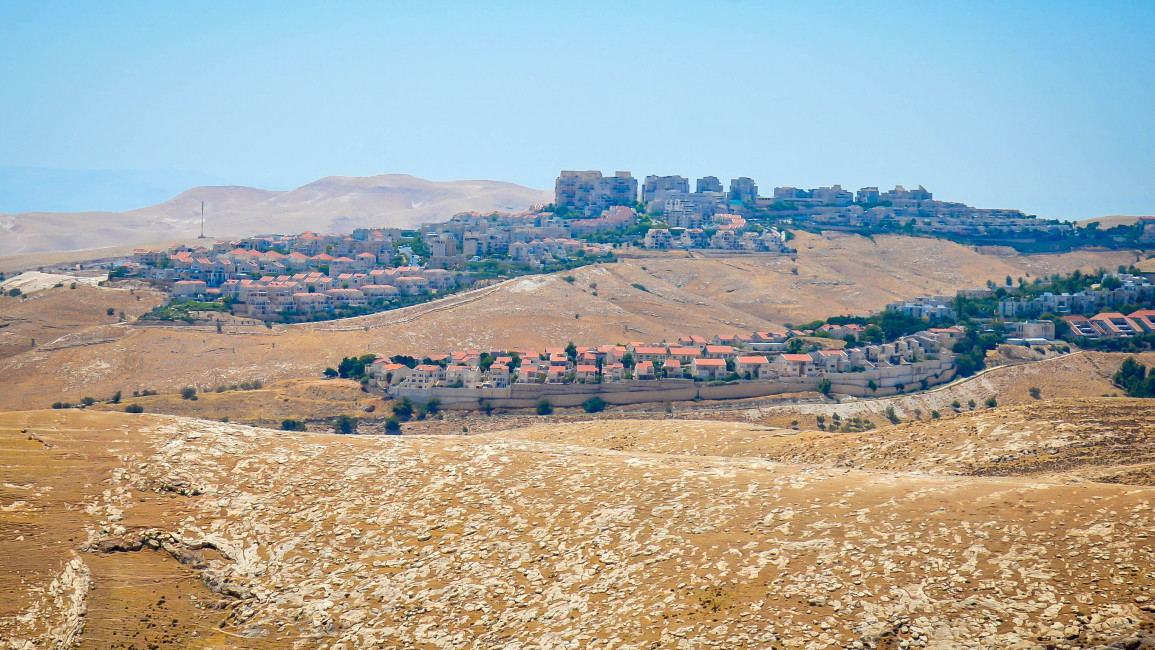Israeli study says settlement policy in occupied West Bank's 'Area C' has failed
Israel's settlement policy in the occupied West Bank's 'Area C' "has failed", an Israeli study concluded last week.
According to the study carried out by three researchers at Israel's Reichman University, Israel has failed to make Israeli settlers' life in 'Area C' "natural" and a part of the Israeli state.
The study focused on Israeli control as opposed to Palestinian control in area 'C' along demographic, economic and social factors.
Demographically, the study pointed out that the illegal Israeli settler population in 'Area C' first increased from 311.300 in 2010 to 491,548 in 2023 under the current Netanyahu government but decreased from 81% to 58.1% in 2023.
Meanwhile, the Palestinian population in 'Area C' increased from 77,000 in 2010 to 354,000 in 2023.
The growth of Israeli settlements amounts to the transfer by Israel of its own civilian population into occupied territories, which is a war crime, UN High Commissioner for Human Rights Volker Turk said. https://t.co/I9tuRdadfD
— ADC National (@adc) March 15, 2024
This disparity, argues the study, is due to the decrease in Israeli settlers' birth rates and Israeli residing in settlements in 'Area C', to the point that in 2020, more Israelis were leaving the illegal settlements in 'Area C' than settling into it.
The study also indicated that the number of illegal Israeli settlements in 'Area C' is 128 and 121 settler outposts. On the other hand, Palestinian-populated locations increased from 12,522 in 2010 to 28,000 in 2023.
The study highlights the fact that this increase in Palestinian properties happened despite Israel's demolition policy of Palestinian structures in 'Area C', which has demolished 8,000 Palestinian properties in the same period.
The study also underlines that although Palestinians are economically more vulnerable, they are more widespread across the area as a result of private ownership of the land.
🔴 Israeli illegal settler bulldozers demolish homes in the airport area, east of Jericho continuing their illegitimate campaign of illegal settlements.
— Daniella Modos - Cutter -SEN (@DmodosCutter) March 18, 2024
🔗 https://t.co/EeO3WzVhMk pic.twitter.com/A9mxXwat2V
The study concluded that "instead of waging an existential war against an area populated by Palestinians who will never be part of a Jewish and democratic state [the Gaza Strip], and instead of drowning of state resources in a losing real estate project [settlement building in the West Bank], the current crisis [the war on Gaza] should be taken advantage from and change orientation".
But this new orientation "could mean mass expulsion", according to Khalil Tafakji, a leading Palestinian expert on Israel's illegal settlements and former head of the maps unit at Jerusalem's Orient House.
"This mass expulsion is happening actively in Masafer Yatta, in the eastern slopes 'Muarrajat' area, and the northern Jordan Valley", said Tafakji.
"However, I don't agree with the overall conclusion of the study because even if the settlement policy in 'Area C' has failed in making the area attractive to Israelis, Israeli settlements in 'Area C' still control 24% of the West Bank's surface".
Area C = full Israeli control
— Enzo (@enzlut2) March 10, 2024
Area B = israeli control of military and criminal matters. PA control of basic civil administration
Area A = (only 3% of the entire area) PA control of both civil and security issues pic.twitter.com/psdt7EHwVx
"The new Israeli strategy in 'Area C' in recent years hasn't relied on population increase, but on land control, which is why Israeli settler herders have been introduced, to control the maximum amount of land with a minimum of resources", he noted. "Also, settlements in 'Area C' have cut the continuity of Palestinian urban areas, making a Palestinian state physically impossible".
"The mass expulsion, however, isn't meant to be outside of the West Bank, but internally, by crowding all Palestinians living in 'Area C' to central locations and clearing the area for Israeli settlements", Tafakji stressed.
In 2018, the Israeli supreme court ratified an Israeli army project to demolish the entirety of the Palestinian Bedouin village of Khan Al-Ahmar, east of Jerusalem and in the heart of 'Area C', and forcibly move inhabitants to a single suburb.
In May of last year, Israeli finance minister Bezalel Smotrich, a fanatic and West Bank settler himself, said in a public event that Khan Al-Ahmar was "not a legal issue" but a territorial one.
#Gaza #AreaC https://t.co/BQjIpdNoly pic.twitter.com/hXd8o6xcts
— Léon Isaak Levi🎗 (@leonisaaklevi) March 17, 2024
"Khan Al-Ahmar will determine if there will be a Palestinian continuity from north to south, from Nablus to Ramallah to Bethlehem, God forbid, or an Israeli Jewish continuity from east to west, from Jerusalem to the Dead Sea", remarked Smotrich.
Area 'C', which includes 62% of the occupied West Bank's surface, was classified separately from the remaining occupied territories in the Oslo Accords in 1993.
The accords stipulated that central occupied West Bank cities classified as'Area A' would be under Palestinian security and civil administration without Israeli military presence except at their entrances.
'Area B', including Palestinian towns surrounding the cities, was put under Palestinian civil administration while maintaining Israeli military control, whereas 'Area C' was kept under complete Israeli control.
The accord was intended to be for five years, ending with the establishment of a Palestinian state. Israel never stopped expanding illegal settlements in 'Area C', among other violations in the agreement.
Israel's colonial settlements in occupied territories are considered a crime according to international law and human rights conventions.


![Minnesota Tim Walz is working to court Muslim voters. [Getty]](/sites/default/files/styles/image_684x385/public/2169747529.jpeg?h=a5f2f23a&itok=b63Wif2V)




![Debris near Rafic Hariri International Airport [Getty]](/sites/default/files/styles/image_330x185/public/2176162423.jpeg?h=a5f2f23a&itok=MCSK9mkM)
![An Israeli air strike on Jabalia killed teenage journalist Hassan Hamad [Screengrab/X]](/sites/default/files/styles/image_212x120/public/2024-10/hassan%20hamad1.jpg?h=c12e0b96&itok=KstD_5xk)
